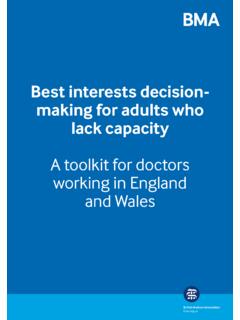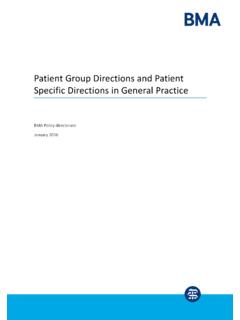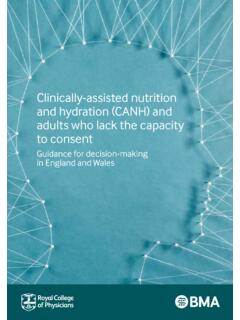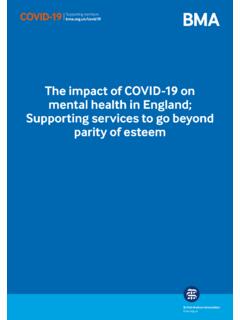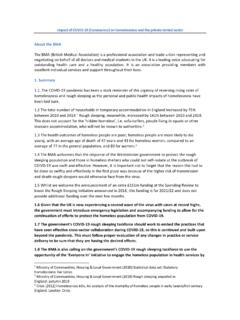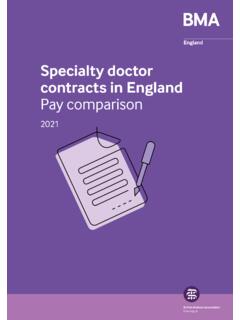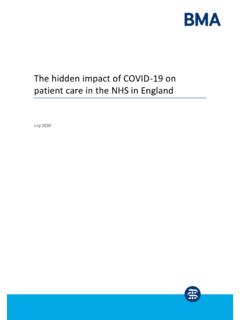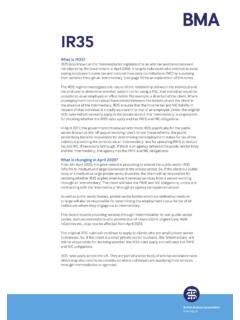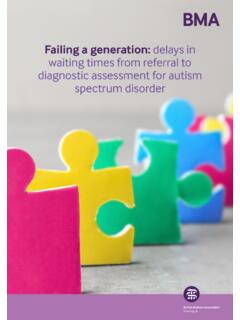Transcription of The law and ethics of abortion - British Medical Association
1 The law and ethics of abortionBMA viewsSeptember 2020 post-ARM updateBritish Medical Medical AssociationThe law and ethics of abortion BMA viewsContents Key points ..21. About this guidance ..3 The BMA view on abortion ..3 2. The law on abortion ..4 Map of the law on abortion .. The law in England, scotland and Wales ..5 24-week time limit .. Early Medical abortion (EMA) .. Temporary changes in response to the COVID-19 pandemic .. abortion for serious fetal abnormality ..7 The requirement for two signatures ..8 Pre-signing of forms ..8 Sex selective abortion ..9 Reduction of multiple pregnancies ..9 Counselling .. Conscientious objection ..11 Legal scope .. Questions about abortion in job applications .. Moral scope ..12 The law in Northern Ireland .. Conscientious objection.
2 Women in Northern Ireland and abortion ..15 The law in the Channel Islands and Isle of Man .. Jersey .. Guernsey, Herm and Jethou .. Isle of Man ..163. Consent and confidentiality .. Consent .. Competent adults ..17 Adults lacking capacity .. Competent minors .. Minors lacking capacity ..19 Involvement of partners ..19 Confidentiality ..19 Adults ..19 Minors .. Duty to report in Northern Ireland ..212 British Medical AssociationThe law and ethics of abortion BMA viewsKey points abortion is lawful in England, scotland , and Wales provided the criteria in the abortion Act 1967 are met. In all other circumstances, administering or procuring an abortion is a crime. abortion is lawful in Northern Ireland provided the criteria in the abortion (Northern Ireland) (No. 2) Regulations 2020 are met.
3 Unless abortion is necessary to save a woman s life or prevent grave permanent injury, doctors have a right of conscientious objection under the abortion Act or the abortion (Northern Ireland) Regulations. At the same time, patients have a right to receive objective and non-judgmental care. Doctors with a conscientious objection should inform patients as soon as possible and must tell them about their right to see another doctor, making sure they have enough information to exercise that right. If it is not practical for a patient to arrange to see another doctor, the doctor must make sure that arrangements are made for another suitably qualified colleague to take over care of the patient. As with all other Medical procedures, patients must give the appropriate consent for abortion . Under-16s can consent to an abortion if they are competent to do so.
4 Those with parental responsibility for minors lacking competency can consent to treatment in their best interests on their behalf. Patients, both adult and child, have the right to confidentiality. This cannot be overridden except in exceptional circumstances. 3 British Medical AssociationThe law and ethics of abortion BMA views1. About this guidance There are few Medical procedures as divisive and politically charged as abortion . This guidance is intended to provide a statement of UK law and ethics so that doctors are aware of their responsibilities and rights regarding termination of pregnancy. It also sets out BMA policy on several aspects of the law. BMA policy and views are flagged throughout this The BMA view on abortion The BMA has longstanding policy which supports the abortion Act 1967 as a practical and humane piece of legislation.
5 This policy dates back to the 1970s and 80s. More recently, the BMA has agreed policy, which calls for changes to abortion legislation to reflect changes in the way healthcare is delivered (see later sections). In addition, in 2017 the BMA agreed policy that abortion should be regulated in the same way as other Medical treatments. This policy states that abortion :i) should be decriminalised in respect of health professionals administering abortions within the context of their clinical practice; ii) should be decriminalised in respect of women procuring and administering the means of their own abortion . The policy does not call for an absence of regulation. Limits could still be set, but they would be subject to professional and regulatory, rather than criminal, sanctions. In addition, criminal and civil laws that apply to other aspects of clinical care would continue to apply to abortion .
6 For example, supplying abortion drugs without a prescription would be a criminal offence under the UK-wide Human Medicines Regulations 2012. The BMA has produced two resources outlining the details of this policy and how it could work in practice both are available on the BMA website at : The removal of criminal sanctions for abortion : BMA Position Paper (2019) How will abortion be regulated in the United Kingdom if the criminal sanctions for abortion are removed? (2019)The BMA recognises the diversity of opinion amongst its membership. However, policy expressed in this document has been agreed through the well-established democratic procedures for making policy at the BMA s ARM. The BMA s advice to its members is to act within the boundaries of the law and their own conscience. Patients are, however, entitled to objective and non-judgmental Medical advice and treatment, regardless of a doctor s personal view.
7 The BMA abhors any instances of harassment or discrimination against doctors on the basis of their views on abortion , either for or against. Additionally, the BMA deplores any instances of intimidation of patients and staff by anti- abortion protesters. The BMA has campaigned for several years for safe / buffer zones outside abortion services to protect staff, women and those accompanying women from harassment and intimidating Medical AssociationThe law and ethics of abortion BMA views2. The Law on AbortionIn addition to the core statute and common law outlined above, abortion is also subject to further regulation, as well as professional and clinical standards. The Termination of Pregnancy (Jersey) Law 1997 The abortion (Guernsey) Law 1997 BEING REFORMED abortion Reform Act 2019 abortion (Northern Ireland) (No.)
8 2) Regulations 2020 Section 25 Criminal Justice Act 1945 abortion Act 1967 Offences Against the Person Act 1861 Infant Life (Preservation) Act 1929 abortion Act 1967 Common law crime abortion Act 1967 Offences Against the Person Act 1861 Infant Life (Preservation) Act 19295 British Medical AssociationThe law and ethics of abortion BMA The law in England, scotland and Wales abortion in England, scotland and Wales is governed by the abortion Act 1967 as amended by the Human Fertilisation and Embryology Act 1990. The abortion Act provides exceptions to the crime of administering or procuring an Under the abortion Act, a pregnancy can be lawfully terminated by a registered Medical practitioner in an NHS hospital or premises approved for this purpose, if two Medical practitioners are of the opinion, formed in good faith: (a) that the pregnancy has not exceeded its twenty-fourth week and that the continuance of the pregnancy would involve risk, greater than if the pregnancy were terminated, of injury to the physical or mental health of the pregnant woman or any existing children of her family; or (b) that the termination is necessary to prevent grave permanent injury to the physical or mental health of the pregnant woman.
9 Or (c) that the continuance of the pregnancy would involve risk to the life of the pregnant woman, greater than if the pregnancy were terminated; or (d) that there is a substantial risk that if the child were born it would suffer from such physical or mental abnormalities as to be seriously handicapped. 1,bTo demonstrate that an opinion has been formed in good faith does not require that the authorisation of an abortion be the right course of action, simply that the doctor has not been dishonest or negligent in forming the opinion that it is. Courts have generally considered that a doctor is acting in good faith if they have complied with accepted Medical practice. Where a doctor is of the opinion, formed in good faith, that the termination is immediately necessary to save the life or to prevent grave permanent injury to the physical or mental health of the pregnant woman the opinion of a second registered Medical practitioner is not required.
10 In these limited circumstances, there are no restrictions on where the procedure may be carried out. The use of hormonal emergency contraception or IUDs (intrauterine devices) does not constitute abortion . A parliamentary question in 1983 clarified that the prevention of implantation in the womb of any fertilised ovum does not equal the procuring of a miscarriage as prohibited by the Offences Against the Person Act Miscarriage should be understood as the end of an established pregnancy. This interpretation was tested and confirmed in the case of R v HS Dhingra in 1991,3 and by a judicial review in a abortion remains a common law crime in scotland ; and a statutor y crime in England and Wales, under the Offences Against the Person Act 1861 and the Infant Life (Preservation) Act 1929. Further detail can be found in the BMA discussion paper Decriminalisation of abortion : a discussion paper from the BMA (Februar y 2017), and UPDATE on the decriminalisation of abortion (March 2017) both available at abortion was partially decriminalised in Northern Ireland under the Northern Ireland (Executive Formation etc) Act 2019 but aspects remain a crime under the Criminal Justice (Northern Ireland) Act 1945 and some new criminal sanctions were introduced under the abortion (Northern Ireland) ( ) Regulations 2020.
